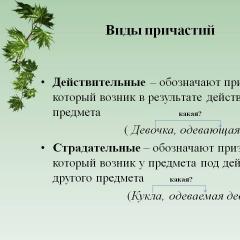Short and full participles: differences
Everyone knows how mysterious and difficult our Russian language is to learn. A huge number of parts of speech and their various forms "live" in it. Short and full participles are particularly difficult. Let us consider the distinctive features of these verb forms in more detail.
Peculiarities
Linguists still have not decided what place in morphology to give to the participles. The authors of textbooks on the Russian language have completely different views on this issue. Some argue that it is only a form of the verb, which expresses not only the action, but also its sign. Others say that it is completely independent and attribute it to parts of speech. But one thing is known: short and full participles are simply irreplaceable for our speech. Without them, we will endlessly use the word "which". For example:
A singing person is a person who sings.
A sick child is a child who is sick.
Work done - work done.
Having with you various dependent words, the participle is part of the participle that adorns our speech.
For example: The wind blowing from the sea refreshed my face.
Full form
One of the features of this part of speech is the ability to form forms. More than adjectives, it is not subject to any part of speech.
The full and short forms of participles differ both grammatically and syntactically. How not to confuse them? Passive participles are called the full form, which usually answer the question "which". They are called passive because in their meaning they imply an action performed by someone.
It is impossible to form short ones.
Example: Acquired - acquired, resolved - resolved.
Concise and full have different syntactic functions. This is because they have different goals. The full form, answering the question "what," is the definition. This is its main similarity with the adjective name.

Therefore, the participle that is part of the turnover is usually called a separate definition.
Don't forget about punctuation marks. If only full forms are included, it stands after the word being defined, then in this case commas must be placed on both sides.
The forest, shrouded in haze, is very beautiful.
If the turnover comes after the main word, then in this situation, commas are not put in any case: The work done on time was approved.
Short form
As we found out, short and full participles are very similar, but they play different roles in sentences.
This form is formed by cutting off the endings from the full one and attaching other endings: carried out - carried out(removed the -th and part of the suffix by adding -a).

Consider the sentence: The trip was paid. The short form of the full participle "paid" is no longer a characteristic of the feature by action. Now she herself shows the process, being part of the predicate. Thus, the short form serves as the main member of the proposal.
The main feature is that short and full participles can change by gender. Written - written, laid down - laid down, lost - lost.
It is not so difficult to distinguish them. A correctly asked participle question will help you easily distinguish the short form from the full one.


